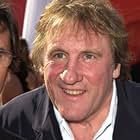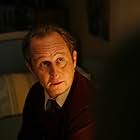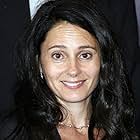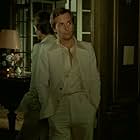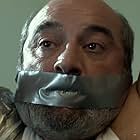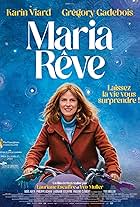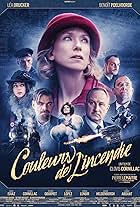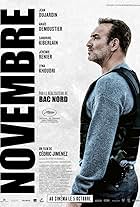It describes the twilight of a sacred monster, Jules Maugin, an actor at the height of his glory. Under the famous personality, the big mouth, and the social shell, lies the intimate portrai... Read allIt describes the twilight of a sacred monster, Jules Maugin, an actor at the height of his glory. Under the famous personality, the big mouth, and the social shell, lies the intimate portrait of a man laid bare.It describes the twilight of a sacred monster, Jules Maugin, an actor at the height of his glory. Under the famous personality, the big mouth, and the social shell, lies the intimate portrait of a man laid bare.
Photos
Storyline
Did you know
- TriviaOriginal literary source: "Les volets verts", novel by Georges Simenon, Presses e la Cité, Paris 1950, 220 pages;
- Quotes
Alice: I went down to Paris to see.
Jules Maugin: To see what?
Alice: I don't know. I hadn't seen it yet.
- ConnectionsReferenced in Complément d'enquête: Gérard Depardieu: la chute de l'ogre (2023)
Featured review
The Last of a Sacred Monster
"Les Volets verts" ("The Green Shutters") is a novel by Georges Simenon, written in 1950 while he was living in the United States. It had long been a project of Maurice Pialat, which unfortunately never came to fruition. Gérard Depardieu, who was persuaded that he was cut out for the role, was slated to be the lead. He therefore felt quite frustrated when the project finally failed. Jules Maugin, an aging, eccentric, alcoholic, hyper-sensitive and egocentric sacred monster, that was him, nobody else but him! So much so that the idea never left him. That is how in 2017, still bearing the project in mind, he wound up proposing it to producers Michèle and Laurent Pétin. Enthusiastic at the idea, they hired the talented Jean-Loup Dabadie to write the adaptation. This he did, transposing the action from the early 1950s to the 1970s, a time when larger-than-life actors still existed (Delon, Gabin, Belmondo,...), a race of which the dinosaur Depardieu is one of the last representatives, if not the last. Fate was to interfere again with the sudden death of Dabadie in 2020. Veteran director Jean Becker (88 years old at the time of filming), the hired director, was shaken but undaunted. Only modifying Dabadie's work to a small extent, adding his personal touch, he gallantly set his cameras rolling. Shooting took place, without any hitch this time, in August and September 2021. Miracle! Completion was achieved: Pialat's project, Depardieu's dream, had finally come to life.
Naturally, filmed by Becker, "The Green Shutters" does not really look like a Mautice Pialat film, it is less naturalistic, less paroxystic than it would have been. But Jean Becker has talent and sensitivity, and his version does not do injustice to Pialat. Not surprising considering that, although the whipping boy of French critics (their pet theme being that Jacques Becker is a genius and his son Jean a botcher), he has behind him an extensive body of work. Not that it revolutionizes the seventh art but not only are Becker's movies well made but they also offer a warm humanist look at those they bring to the fore (the group of friends in "The Children of the Marshland", the resistance fighters in the pits of "Strange Gardens", the illiterate odd-job man and the well-read old lady in "My Afternoons with Margueritte", to mention only a few).
As for Gérard Depardieu, a much less disputed figure, his great complicity with his director (this is their third collaboration) allows him to give full swing to his acting. Becker, well aware of Depardieu's showman's tremendous abilities, adopts the best of solutions, leaving him carte blanche. Hence an anthology Maugin. Hence also a troubling floating sensation, which soon becomes part of a somewhat weird pleasure: are we seeing Depardieu playing Maugin? Or Maugin as a definite character, existing only within the frame of the story? Or is it a case of an actor being overwhelmed by the personage he embodies? Or else of Maugin being phagocyted and then regurgitated by the ogre Depardieu? A bit of each probably. The sure thing is that we never really know where to draw the line, a fascinating experience indeed! Which makes the actor's bigger-than-life performance the major asset of this otherwise fine film. It would not be surprising if in the future, despite "The Green Shutters" not being a great public success, Maugin was one of the roles the actor will be remembered for. As a matter of fact, Depardieu has given so much of himself to his character that he is him, rather than plays him. To be sure, Gérard has every reason to identify with Jules: a hypersensitive thespian, a worn-out man once influential in the world of theater and cinema - now being more and more sidelined (a disgrace well illustrated by the scene of the commercial shooting where Maugin is forced to praise the merits of a beer, non-alcoholic into the bargain!). Excessive in everything, attitudes and feelings alike, Maugin and Depardieu both have had a hectic lifepath; both are paunchy, hard-drinking and self-destructive, but also truly great actors, if ham-fisted at times. The only real dissociation between the character and his performer is that at 74, Depardieu is still... alive
No doubt the revered actor will be spared the barbs of critics. No doubt either Becker will not. He never is no matter what he does. His direction will invariably be dubbed dull, unimaginative, slavishly illustrative or, worst of all, "academic", a term originally used to qualify works made according to the rules of the art but now used offensively by those happy few who hate it when they have nothing to explain or have nothing to rave about. I would rather use the term "classical". As far as Jean Becker's direction is concerned, it is in fact synonymous with well-made, discreet, modest, unobtrusive. Which does not mean that there is no artistry at all in his films. "The Green Shutters" in particular contains a couple of nicely crafted sequences, which definitely raise it above the average. Two of them are particularly worth mentioning. In the first one, set in the initial part of the narrative, Maugin is shown spying through the window of a shoe store; immediately after, the camera substitutes itself to him and reveals the presence on the other side of the window of Jeanne, his longtime partner and unrequited love (Fanny Ardant, radiant). The lady trying on a pair of shoes, unexpectedly starts a graceful dance movement: if you are not stubbornly hostile to the director, you will experience a magic feeling, equivalent to the character's wonderment. During this brief poetic moment, Jeanne is not Jeanne anymore but the lovely princess of a fairy tale.
Another sequence has an exhilarating virtue and could well become cult. It takes place after Maugin has had, once again, a memory lapse in the middle of a play. Unsettled as he is, he needs to reassure himself. His presence in a restaurant gives him the opportunity: grabbing the menu, he memorizes it at full speed and starts to recite to the astonished customers all the dishes offered, as if it was a text signed Rostand. An enjoyable and unexpected sequence that proves that Jean Becker is not just a plodding filmmaker.
Let's also talk about the cast carefully assembled by Jean Becker: everyone is in their place, all generations included, from the already named Fanny Ardant (with an incomparable ironic charm) to Benoît Poelvoorde (sober and all the more touching in the role of the faithful friend), to the young generation represented by Stefi Celma (sensitively portraying Maugin's young protégé) - to mention only a few.
Let's not forget either the warm-toned photography by the gifted Yves Angelo ("All the Mornings of the World", "A Heart in Winter") , the careful sets of Loïc Chavanon ("At Eternity's Gate", the film on Van Gogh), the fine score by the Belgian composer Frédéric Vercheval ("Diamant 13", "Secret Name") All in all, "The Green Shutters" is quite a beautiful film, if not very optimistic (but hasn't melancholy its own charms .). Most of the viewers (but the youngest) will follow it with interest from beginning to end.
"Les Volets verts" ("The Green Shutters") is a novel by Georges Simenon, written in 1950 while he was living in the United States. It had long been a project of Maurice Pialat, which unfortunately never came to fruition. Gérard Depardieu, who was persuaded that he was cut out for the role, was slated to be the lead. He therefore felt quite frustrated when the project finally failed. Jules Maugin, an aging, eccentric, alcoholic, hyper-sensitive and egocentric sacred monster, that was him, nobody else but him! So much so that the idea never left him. That is how in 2017, still bearing the project in mind, he wound up proposing it to producers Michèle and Laurent Pétin. Enthusiastic at the idea, they hired the talented Jean-Loup Dabadie to write the adaptation. This he did, transposing the action from the early 1950s to the 1970s, a time when larger-than-life actors still existed (Delon, Gabin, Belmondo,...), a race of which the dinosaur Depardieu is one of the last representatives, if not the last. Fate was to interfere again with the sudden death of Dabadie in 2020. Veteran director Jean Becker (88 years old at the time of filming), the hired director, was shaken but undaunted. Only modifying Dabadie's work to a small extent, adding his personal touch, he gallantly set his cameras rolling. Shooting took place, without any hitch this time, in August and September 2021. Miracle! Completion was achieved: Pialat's project, Depardieu's dream, had finally come to life.
Naturally, filmed by Becker, "The Green Shutters" does not really look like a Mautice Pialat film, it is less naturalistic, less paroxystic than it would have been. But Jean Becker has talent and sensitivity, and his version does not do injustice to Pialat. Not surprising considering that, although the whipping boy of French critics (their pet theme being that Jacques Becker is a genius and his son Jean a botcher), he has behind him an extensive body of work. Not that it revolutionizes the seventh art but not only are Becker's movies well made but they also offer a warm humanist look at those they bring to the fore (the group of friends in "The Children of the Marshland", the resistance fighters in the pits of "Strange Gardens", the illiterate odd-job man and the well-read old lady in "My Afternoons with Margueritte", to mention only a few).
As for Gérard Depardieu, a much less disputed figure, his great complicity with his director (this is their third collaboration) allows him to give full swing to his acting. Becker, well aware of Depardieu's showman's tremendous abilities, adopts the best of solutions, leaving him carte blanche. Hence an anthology Maugin. Hence also a troubling floating sensation, which soon becomes part of a somewhat weird pleasure: are we seeing Depardieu playing Maugin? Or Maugin as a definite character, existing only within the frame of the story? Or is it a case of an actor being overwhelmed by the personage he embodies? Or else of Maugin being phagocyted and then regurgitated by the ogre Depardieu? A bit of each probably. The sure thing is that we never really know where to draw the line, a fascinating experience indeed! Which makes the actor's bigger-than-life performance the major asset of this otherwise fine film. It would not be surprising if in the future, despite "The Green Shutters" not being a great public success, Maugin was one of the roles the actor will be remembered for. As a matter of fact, Depardieu has given so much of himself to his character that he is him, rather than plays him. To be sure, Gérard has every reason to identify with Jules: a hypersensitive thespian, a worn-out man once influential in the world of theater and cinema - now being more and more sidelined (a disgrace well illustrated by the scene of the commercial shooting where Maugin is forced to praise the merits of a beer, non-alcoholic into the bargain!). Excessive in everything, attitudes and feelings alike, Maugin and Depardieu both have had a hectic lifepath; both are paunchy, hard-drinking and self-destructive, but also truly great actors, if ham-fisted at times. The only real dissociation between the character and his performer is that at 74, Depardieu is still... alive
No doubt the revered actor will be spared the barbs of critics. No doubt either Becker will not. He never is no matter what he does. His direction will invariably be dubbed dull, unimaginative, slavishly illustrative or, worst of all, "academic", a term originally used to qualify works made according to the rules of the art but now used offensively by those happy few who hate it when they have nothing to explain or have nothing to rave about. I would rather use the term "classical". As far as Jean Becker's direction is concerned, it is in fact synonymous with well-made, discreet, modest, unobtrusive. Which does not mean that there is no artistry at all in his films. "The Green Shutters" in particular contains a couple of nicely crafted sequences, which definitely raise it above the average. Two of them are particularly worth mentioning. In the first one, set in the initial part of the narrative, Maugin is shown spying through the window of a shoe store; immediately after, the camera substitutes itself to him and reveals the presence on the other side of the window of Jeanne, his longtime partner and unrequited love (Fanny Ardant, radiant). The lady trying on a pair of shoes, unexpectedly starts a graceful dance movement: if you are not stubbornly hostile to the director, you will experience a magic feeling, equivalent to the character's wonderment. During this brief poetic moment, Jeanne is not Jeanne anymore but the lovely princess of a fairy tale.
Another sequence has an exhilarating virtue and could well become cult. It takes place after Maugin has had, once again, a memory lapse in the middle of a play. Unsettled as he is, he needs to reassure himself. His presence in a restaurant gives him the opportunity: grabbing the menu, he memorizes it at full speed and starts to recite to the astonished customers all the dishes offered, as if it was a text signed Rostand. An enjoyable and unexpected sequence that proves that Jean Becker is not just a plodding filmmaker.
Let's also talk about the cast carefully assembled by Jean Becker: everyone is in their place, all generations included, from the already named Fanny Ardant (with an incomparable ironic charm) to Benoît Poelvoorde (sober and all the more touching in the role of the faithful friend), to the young generation represented by Stefi Celma (sensitively portraying Maugin's young protégé) - to mention only a few.
Let's not forget either the warm-toned photography by the gifted Yves Angelo ("All the Mornings of the World", "A Heart in Winter") , the careful sets of Loïc Chavanon ("At Eternity's Gate", the film on Van Gogh), the fine score by the Belgian composer Frédéric Vercheval ("Diamant 13", "Secret Name") All in all, "The Green Shutters" is quite a beautiful film, if not very optimistic (but hasn't melancholy its own charms .). Most of the viewers (but the youngest) will follow it with interest from beginning to end.
- guy-bellinger
- Jan 28, 2023
- Permalink
- How long is The Green Shutters?Powered by Alexa
Details
Box office
- Budget
- €6,200,000 (estimated)
- Gross worldwide
- $2,145,566
- Runtime1 hour 38 minutes
- Color
- Aspect ratio
- 2.35 : 1
Contribute to this page
Suggest an edit or add missing content



